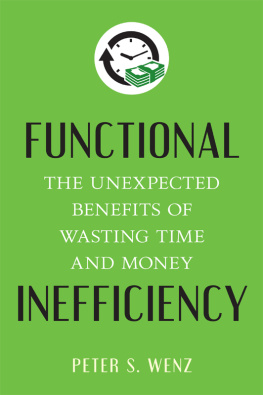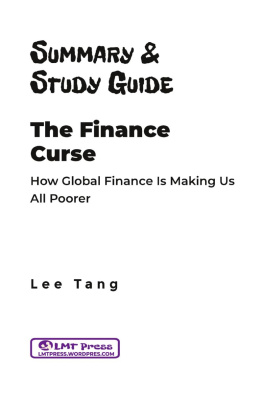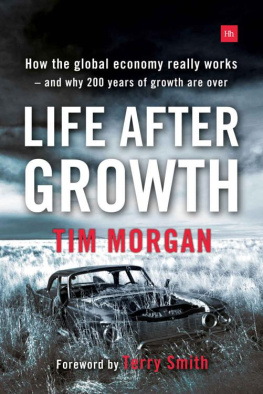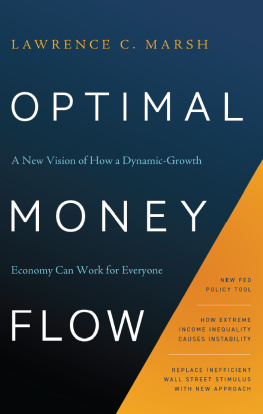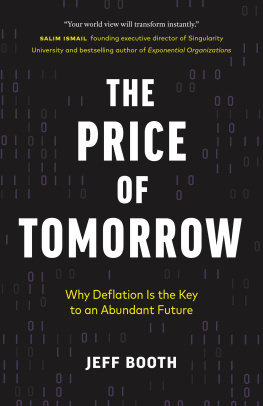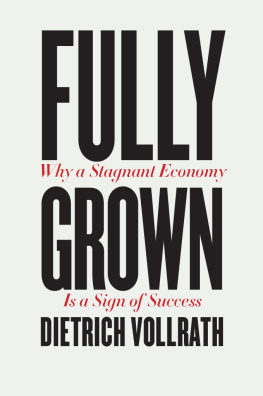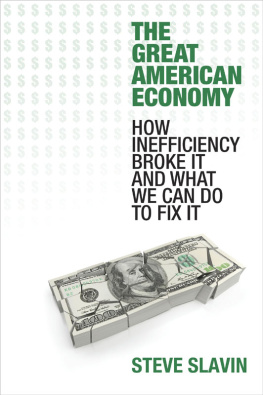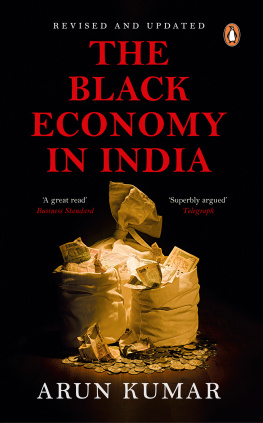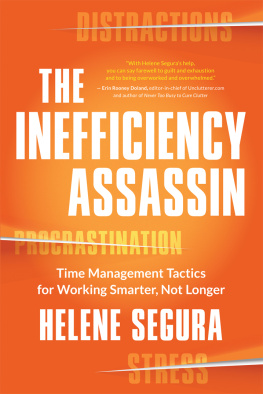
Many people were kind enough to help me with this book. Most of them are members of CIPG, the Central Illinois Philosophy Group, including Jose Arce, Peter Boltuc, Meredith Cargill, Cindy Cochrane, Bernd Estabrook, Bob Kunath, Dick Palmer, Larry Shiner, and Bill Underwood. Special thanks among these thinkers are due to Meredith and Larry for being such pains in the butt. I thank additionally my New York City friend Steve Allen, who tried to keep my figures honest. Any remaining errors are entirely my fault for not having smarter friends.
I want to thank my agent, Grace Feedson, and my editor at Prometheus, Steven L. Mitchell, the former for finding the latter and the latter for exercising good judgment.
Finally, I thank my wife, Grace, who was always available and even seemed happy to assist when I had queries or quandaries to sort through.

How can inefficiency be beneficial? Contemporary Americans value efficiency. We assume that efficiency is a good thing, and we take inefficiency to be dysfunctional. In this book I explain how problems of unemployment stemming from increasingly efficient uses of labor lead us nevertheless to tolerate certain inefficiencies that serve the function or are meant to serve the function of reducing unemployment. I identify six categories of social practices that address or are meant to address unemployment, investigating efficiencies and inefficiencies associated with each category, and suggesting ways to promote American economic growth and job creation within environmental limits with less inefficiency. I use four criteria to evaluate each category and its component practices. Do the practices in the category actually reduce unemployment? Do they embody efficiency or inefficiency? Are they environmentally sustainable? And is adoption of the practices culturally acceptable and politically feasible in the current American context? I conclude that the American economy can grow indefinitely and create an unlimited number of jobs within environmental limits while many inefficiencies that impair human welfare are eliminated. But to keep unemployment at acceptably low levels, some forms of inefficiency must remain.
The First Opium War (18401842) between Britain and China illustrates how, under conditions of increasing labor efficiency, inefficiency can function to forestall or reduce unemployment. In 1839, Chinese Commissioner Lin Tse-hsu addressed an open letter to the young Queen Victoria of England. His concern was that smugglers using British ships were supplying opium to the people of China, resulting in massive addiction. His complaint will sound familiar to twenty-first century Americans concerned about cocaine from Columbia and heroin from Afghanistan.
Commissioner Lin assumed incorrectly that opium was illegal in England, but he was certainly correct about the drug's baleful influence. Opium consumption slows the heart and general metabolism, causes irregularity of basic bodily functions, and leads to loss of body weight. Worst of all, it's addictive, becoming as necessary to the addict as food or water. Withdrawal symptoms are severe, including extreme restlessness, chills, hot flushes, sneezing, sweating, salivation, running nose, nausea, vomiting, and diarrhea. There are severe cramps in the abdomen, legs, and back; the bones ache; the muscles twitch; and the nerves are on edge. Every symptom is in combat with another. The addict is hungry, but he cannot eat; he is sleepy, but he cannot sleep. Most addicts will lie, cheat, steal, ignore work and family obligations, and violate all other moral norms essential to society's peace and prosperity just to get another dose. It's hard to imagine a more baleful use of resources than to promote such an addiction. This is why Commissioner Lin assumed opium consumption to be illegal in England.
We are of the opinion, Lin wrote, that this poisonous article is clandestinely manufactured by artful and depraved people of various tribes under the dominion of your honorable nation. Doubtless you, the honorable sovereign of that nation, have not commanded the manufacture and sale of it. (This was true. The queen had not commanded the manufacture and sale of opium, but neither had she effectively prohibited it.) Lin continued, To manufacture and sell it, and with it to seduce the simple folk of this land, is to seek one's own livelihood by exposing others to death, to seek one's own advantage by another man's injury. Such acts are bitterly abhorrent to the nature of man and are utterly opposed to the ways of heaven. Commissioner Lin then appealed to the Golden Rule,
Let us suppose that foreigners came from another country, and brought opium into England, and seduced the people of your country to smoke it. Would not you, the sovereign of the said country, look upon such a procedure with anger, and in your just indignation endeavor to get rid of it? Now we have always heard that Your Highness possesses a most kind and benevolent heart. Surely then you are incapable of doing or causing to be done unto another that which you should not wish another to do unto you.
The commissioner recommended that Queen Victoria destroy the poppy fields and punish manufacturers of opium. His letter, which probably never reached the queen, was intended to solicit cooperation regarding illegal opium traffic, thereby reducing tensions between the two countries and averting war.
For his part, the commissioner was determined to catch and punish those who tried to smuggle opium into China. He had been sent by the Chinese emperor to Canton, the main locus of legitimate trade between China and the rest of the world, to eradicate the illegal traffic. He knew that ships anchored offshore contained huge amounts of opium and demanded that this contraband cargo be given to him for destruction. He wouldn't accept the word of British and American sea captains that they would abandon efforts to move the heroin to the mainland. When the cargo was not turned over to him, he confined all the foreign merchants in Canton's factory district (the area of foreign trading), denying them some of the comforts of life for forty-seven days until they finally relented.
The merchants who owned the opium complained that the seizure of their property was illegal and demanded compensation from the Chinese or from their own governments. But Commissioner Lin didn't think he owed them anything, any more than current drug enforcement agencies feel obligated to compensate manufacturers and smugglers when they confiscate and destroy illegal drugs.
While all of this was taking place, British naval officers in the area appealed to England to send war ships, which arrived the following year. The British were determined to force the Chinese to allow free trade along the Chinese coast. Against international trading rules then and now, the British had no intention of interfering with the illegal opium traffic because that traffic helped Britain sell the enormous quantities of cotton goods that were then pouring out of the recently mechanized and increasingly efficient mills in Lancashire.
The nineteenth-century conflict between Britain and China over opium may be the first indication in history that labor efficiency often provokes countervailing inefficiency. Cotton textiles were the foundation of early British industrialization and remained its backbone until about 1840. Textiles are important in every society because there's always a market; everyone needs at least one set of clothing. English manufacturers started to meet this demand in novel ways with James Hargreaves's invention of the spinning jenny in about 1764,
Next page
